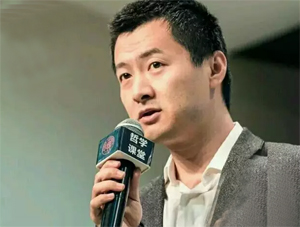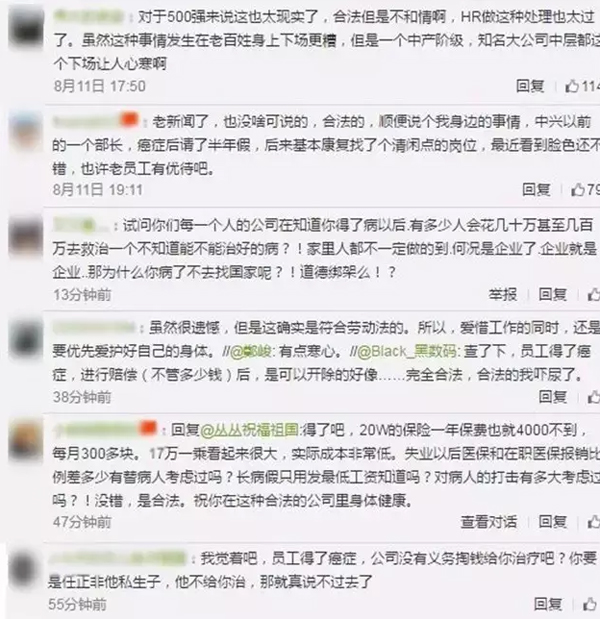Abstract Is it unreasonable for Huawei to compensate Wei Yanzheng? In the face of such critically ill patients, what kind of posture or responsibility does Huawei and other companies put into human nature? On August 8, 2016, Wei Yanzheng, a former Huawei executive with cancer, passed away at the age of 41,...

On August 8, 2016, Wei Yanzheng, a former Huawei executive with cancer, passed away at the age of 41. Wei Yanzheng’s wife sent a circle of friends to say goodbye to him. Everyone’s mood is as the doctor said before, “It’s a pity to be so young.â€
Wei Yanzheng detailed the experience since the illness and the relationship with the company in "I am in the half-year of Huawei", "I am in the anti-cancer years of Huawei" and "Life is like a few memories".
Wei Yanzheng, who graduated from the Department of Computer Science at Peking University and received his Ph.D. from the University of Southampton in the United Kingdom, worked at the CTO office of the British Telecommunications Research Institute. In 2006, he returned to China to join Huawei, and from technology to the market, he was quickly promoted to 18 experts due to his excellent work.
In 2011, the detection of "clear cell sarcoma" was a terminal illness with a three-year mortality rate of up to 80%. After expanding the resection, he returned to work. After two years, he experienced the process of diffusion, amputation, radiotherapy, chemotherapy, recurrence, and diffusion.
In 2012, Wei Yanzheng in the sick leave said that he received a notice of “the labor contract was postponed until the end of the sick holidayâ€, and the communication with HR was informed that “the new contract was renewed after the end of the sick holidayâ€, out of trust for the temporary period during which he signed the sick leave. Contract, but did not renew the new contract afterwards.
In the same year, Huawei paid 200,000 yuan to Wei Yanzheng through a large-scale commercial insurance.
In 2013, Wei Yanzheng received a telephone notice that if the deadline for May 6th could not be paid, the sick leave would be considered as the end of the sick leave. He also received a reply from the relevant department. According to the law, the company may not renew the contract with him, and the labor contract will be terminated automatically after the sick leave."
At the same time, Wei Yanzheng mentioned in his blog that Huawei intends to compensate N+1 (that is, one month's salary for each year's working age, N is the service age) with 80% of Shanghai's average salary of 4,000 yuan.
On June 23, 2016, one month before Wei Yanzheng's death, he still wrote in the article that Huawei was terminated with him when he was most helpless after his cancer amputation.
Faced with executives with the most rare malignant tumors, Huawei, known for its overtime culture and suffering, has become a target of netizens' condemnation, and has also sparked a huge debate about employee illness and corporate responsibility.

Wei Yanzheng's last comment on Weibo
The arguments of netizens are mainly focused on several points: Huawei compensates Wei Yanzheng according to regulations, legal but unreasonable; in the face of serious illness, Wei Yanzheng should give patients more care; Huawei should do things according to enterprise regulations and should not be implemented "Ethical abduction"; countries and organizations are not reliable, and the health of their loved ones is the most important. In fact, the bottom line is that Huawei’s compensation to Wei Yanzheng is unreasonable. In the face of such critically ill patients, what kind of posture or responsibility does Huawei and other companies put into human nature?
“How much compensation does Huawei give Wei Yanzheng?â€
"How much does Huawei compensate Wei Yanzheng?", "Warning during the sick leave, dividends are not considered compensation?" This is the most concerned issue of the outside world, which is also a point of interest for each employee.
According to Wei Yanzheng's article, in 2012, Huawei paid him a one-off payment of 200,000 yuan through the major medical insurance. In 2013, Huawei paid 3200×(N+1) compensation on the basis of Shanghai's average salary, and signed two years of long-term sick leave. contract.
He also wrote, "There are cancer patients, surgery, radiotherapy, and chemotherapy at home. You will know that 200,000 are far enough! My malignant tumor is the rarest and most malignant sarcoma. The existing chemotherapy. The medicine doesn't work for me at all. 3200×(N+1), it's really enough to buy one or two packs of potions that are useless. You can also buy a few packs of milk powder.â€
In this way, Huawei's compensation for Wei Yanzheng should be 200,000 and 3,200 × (N + 1) compensation for long-term commercial insurance and long-term sick leave. However, from the words of Wei Yanzheng, he was very dissatisfied with the compensation given by Huawei. He even used Huawei's huge donations to compare.
However, there are also internal employees of Huawei. For example, executives like Wei Yanzheng, his personal income does not look down on the disease every year. He wants to give more protection to his family.
As a level 18 employee, it is already at the top of the food chain. The annual salary should be around one million, and there are corresponding stock dividends, about 1.2 million to 3 million. An employee at Huawei's "Sound Community" mentioned that because of his high personal income, many people also reduced his sympathy. Some people even think that he is not satisfied and does not know how to be grateful.
However, legitimate work income and company compensation are two concepts after all. The work income is from a personal point of view, and the compensation is from a company perspective. Should Wei Yanzheng’s salary and equity dividends earned from his work be regarded as a prerequisite for him not to receive more compensation?
At present, Huawei has not responded to the relevant compensation.
"In addition to serious illness, overworked and dead events are also difficult."
In addition to the serious death of employees, in recent years, with the rapid development of the Internet, high-intensity, performance appraisal, frequent overtime and other factors have led to the sudden death of employees.
On the evening of April 3, 2014, the netizen “Juvenile Judging Adult†Weibo broke the news that a pregnant employee who had worked in Ali for 6 years died of a major uterine bleeding, and his family believed that the main cause of his death was caused by overload work. Overworked and died. The netizen believes that the "culprit" is an unreasonable system design and performance appraisal of Ali.
The news broke that the pregnant woman was still working on the pregnancy leave at midnight on April 2. Moreover, after the employee was examined for ectopic pregnancy this year, he did not go to check his body because he did not want to be assessed when he gave the year-end award in April. After receiving the notice of death, Ali immediately set up an accident emergency response team to assist the employee's family to handle the formalities for compensation.
Ten years after such a thing happened, Tencent also experienced employee overwork deaths. On December 15, 2015, Ma Xiaolan, senior vice president of Tencent Games, sent a letter inside the department: frontlee (Li Junming), deputy head of the voice engine group of the technology research and development center, on the evening of December 13th, as usual, accompanied his wife in the community walk. Suddenly fainted to the ground, after the rescue was invalid.
When the news came out, it caused an uproar within Tencent. Although Li Junming’s death did not occur during the overtime work, many Tencent employees thought that he was overworked because of long-term overtime work. Therefore, a number of employees jointly asked Tencent to work overtime to avoid overtime. Subsequently, the company's executives stated that the company would help the family to overcome the difficulties to the maximum extent and promised to take various measures to reduce overtime.
In May of this year, the tragedy of overworked death occurred again. Netease female editor died of liver cancer, only 28 years old. On March 7th, she wrote on Weibo “Life Countdown!†This sentence is sentimental. In early April, she forwarded @人民日报, “It takes only 4 steps from fatigue to cancer! Are you still overdraining your body? "A text, and the text "I am an example."
Sadly, such overworked deaths may still happen. Nowadays, there are no clear boundaries in work and life. What should happen to the company?
“How much responsibility does the company have to be human?â€
With regard to "economic compensation", the "Labor Contract Law" stipulates that: economic compensation shall be paid to the laborer according to the standard of the laborer's work in the unit and paying one month's salary every year. If the period of less than six months is less than one year, it shall be calculated on a one-year basis; if it is less than six months, the laborer shall be paid an economic compensation of half-month salary.
If the monthly salary of the employee is higher than the average monthly salary of the employee in the previous year in the municipality directly under the Central Government or the district-level people's government, the standard for paying the economic compensation to the employer shall be three times the average monthly salary of the employee. The period of payment of economic compensation to them is no more than twelve years. The term “monthly wage†as used in this Article refers to the average wage of a worker within 12 months before the termination or termination of the labor contract.
As far as Huawei's compensation standard for Wei Yanzheng is concerned, it is compensated by multiplying 80% (3200) of Shanghai's average wage of 4,000 yuan by N+1. Even with the 200,000 business insurance for serious illnesses, many netizens believe that Huawei is a wolf-like company, ruthless and unmanned.
For Ali, Tencent and Netease, we have not seen the specific compensation situation, nor can we judge whether it is reasonable for employees. However, technology companies are constantly improving the relevant welfare system.
In June of this year, Fang Huiling, Assistant General Manager of Tencent's Salary and Welfare Department and Director of Human Resources of Tencent, said at the “Tencent Employees' Carnival†campaign that, like Google, Tencent also had similar employees' “death benefitsâ€.
Fang Huiling said that in Tencent, the family members of the deceased employees can also receive half a salary for ten years. If the employee has children, there will be an additional increase for each additional child, and each child will receive a 12-month salary. In the specific issuance, part of it is a payment, because in the event of misfortune, the family will need to use the money; in another part, Tencent will be handled through the trust company.
As early as August 2012, Google launched the “post-mortem welfareâ€. After the death of Google employees due to an accident, their spouse can continue to receive 50% of the salary of the deceased employee within 10 years. Moreover, the stocks are immediately attributed to themselves after the death of the employees. The children of the dead employees will receive $1,000 per month until the age of 19, and for full-time students is 23 years old, and the "death benefits" have no requirements for the employee's tenure.
Baoji Zhipu Non-ferrous Metals Processing Co,.Ltd has its own technical research team in producing monsingle crystal furnace accessories. Supported by government,we are trustable in this field. High quality and advanced technique are our advantages. Our products have four series branch: tungsten, molybdenum and tantalum parts in all kinds of high temperature furnace; Tungsten Wire rope and other series products for pulling method of all kinds of semiconductor crystal growth; tungsten, molybdenum, tantalum and niobium refractory metals` plates, bars, wires, tubes; various diaphragms and electrodes.
Tantalum Ground Ring,Tantalum Plate,Tantalum Diaphragm,Tantalum Tube
Baoji Zhipu Non-Ferrous Metals Processing Co., Ltd. , http://www.czpmow.com